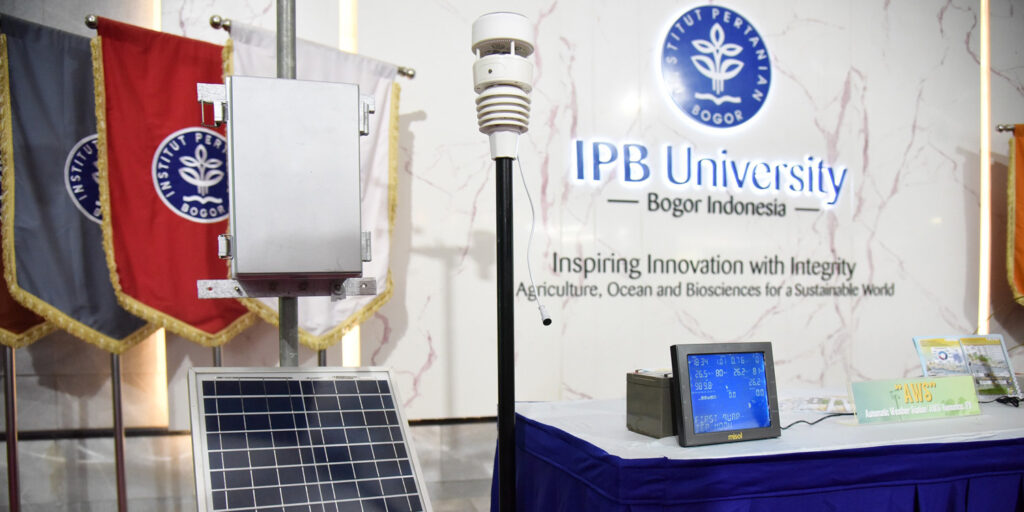Weather uncertainty due to climate change is a serious challenge faced by the Indonesian agricultural sector, especially in rural and remote areas that have not been reached by official weather station networks.
In fact, the availability of accurate and local weather data is needed by farmers to make important decisions in agricultural activities, such as determining planting schedules, fertilisation, pest control, and harvesting.
To answer this need, the IPB University research team initiated an innovative programme called the Automatic Weather Station Community (AWS Community). This initiative presents community-based weather technology to support adaptive and sustainable agriculture.
The team consists of Dr Idung Risdiyanto and Dr Akhmad Faqih from the Department of Geophysics and Meteorology (GFM), Faculty of Mathematics and Natural Sciences (FMIPA), and Prof Suryo Wiyono from the Faculty of Agriculture (Faperta).
The development and implementation of this innovation collaborates with many stakeholders such as farmer groups, Tani Nelayan Centre IPB, Sinau Bumi Foundation, Kedaulatan Rakyat Foundation for Food Security (KRKP), Gerakan Petani Nusantara (GPN), as well as agricultural extension workers and partner institutions in various regions.
Through a participatory approach and the spirit of gotong royong, a total of 82 AWS units have been installed in 11 provinces, ranging from Aceh, Riau, Jambi, Banten, West Java, Central Java, Jakarta, DI Yogyakarta, East Java, Bali to West Sulawesi. The AWS units are placed in the fields of farmer groups, offices of the Agricultural Extension Centre (BPP), as well as educational institutions such as universities and Islamic boarding schools.
“Each AWS records the main weather parameters such as air temperature, rainfall, relative humidity, solar radiation, dew point, air pressure and wind speed automatically every five minutes,” explained the chairman of the research team, Dr Idung Risdiyanto in the Launching of IPB Innovation 2025 at Dramaga Campus, Wednesday (5/14).
He added that the collected data is stored on a cloud-based server and can be accessed online through a special monitoring platform portal www.sinoptik.ipb.ac.id and map.sinaubumi.org.
The platform is currently being developed to expand storage capacity and strengthen service functionality for the agricultural and environmental sectors. The utilisation of Internet of Things (IoT) technology in this system enables real-time data transmission from various points across Indonesia without the need for manual intervention.
Furthermore, the data collected from the community AWS is not only used for monitoring, but also for building location-specific weather prediction models using machine learning and IoT approaches.
“By analysing historical data and weather patterns, this system can produce short-term weather forecasts that are useful for farmers in planning planting schedules, harvesting, fertilisation, pest control, and crop management more precisely and adaptively,” he explained.
Currently, Dr Idung said, the research team is also developing forecasting of rice disease pests such as brown planthopper and blast.
He said that the utilisation of the AWS community has made a real impact in various activities. Some of them are data support for rice pest forecasting research in Subang, provision of weather data for IPB lecturers and students, training farmers in reading meteorological data, and assistance in planning precision agricultural activities.
One concrete form of AWS utilisation occurred in the handling of the onion disease epidemic in Demak in 2025 which was carried out together with the Directorate of Horticultural Plant Protection, Ministry of Agriculture.
In addition, said Dr Idung, the data generated by the AWS has also been used in providing early warning of potential brown planthopper attacks for rice farmers in Java in early 2025. These farmers are members of the AWS community network, so they can take preventive action more quickly and precisely.
Communication and technical assistance are actively conducted through the WhatsApp group of AWS user farmers and partners, which serves as a forum for real-time information sharing and field consultation.
“ This community weather station is not just a measuring technology, but part of the ecosystem of empowering farming communities so that they are able to make data-based decisions and are more resilient in the face of climate change,” said Dr Idung.
According to him, with proper education and training, farmers can read the weather information themselves and adjust cropping practices more effectively. This initiative also plays an important role in supporting Sekolah Lapang Petani (SLP) activities, an educational forum where weather data is used as practical teaching material.
On the other hand, infrastructure development and the use of cutting-edge technologies such as IoT and machine learning also strengthen the sustainability of this programme. Smart sensors and web-based monitoring systems enable instant delivery of data to users in the field and support a continuously updated algorithm-based prediction system.
Nonetheless, Dr Idung admits challenges remain, especially in terms of operational funding, technical training, formal recognition of community data and sustainability of the community AWS ecosystem.
Therefore, support from institutions such as the Ministry of Agriculture and the Meteorology, Climatology and Geophysics Agency (BMKG) is needed to integrate community weather station data into the national weather information system and improve prediction accuracy nationwide.
“With close collaboration between universities, farmers, civil society, and government agencies, this initiative is expected to become a model for developing a participatory and inclusive climate information system in Indonesia,” he emphasised.
Through the utilisation of relevant and easily accessible weather data, farming communities can sustainably improve food security and productivity. (*/Rz) (IAAS/PRP)

